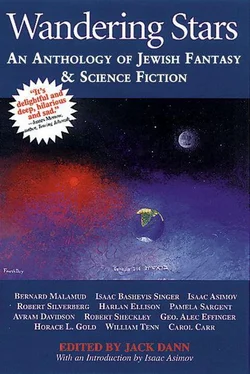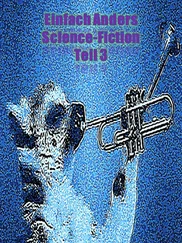You’re not blind, you can see my hair, even at my age, how heavy and coarse it is. And believe me, it’s thinning out, it’s nothing to what it was. My boy, Aaron David, he has the traditional hair of our family, each one twice, three times as thick as a normal hair, his head always going up into a black explosion. When he comes with me, as helper on a job, the customer usually says something like, “With a head of hair like that, what for do you need to carry around coaxial cable?” I say to them: “Bite your tongue. Maybe Haman or Hitler would have used his hair for coaxial cable, or that unholy pair, Sebastian Pombal and Juan Crevea, they also liked to take our heads as raw material in their terrible factories, but don’t you talk like that in the year 2859 to a Jewish father about his Jewish son.” The Eternal, blessed be He, may demand my son of me, but to nobody else will I be an Abraham who doesn’t defend his Isaac. You know what I mean?
So when Rabbi Smallman picks up a dented can and pokes Aaron David’s hair at a hole, the hair comes back right away like a piece of bent wire. What else? And when he tries it with another can, again the hair won’t go in. So Rabbi Smallman points to the first can they brought him, the one they tested with the old man’s hair, and he says, “I declare the food in this can unfit and unclean. But these others,” and he waves his hand at the rest of the shipment, “are perfectly acceptable. Carry them home and enjoy your seder.”
They crowd around him with tears in their eyes and they thank him and they thank him. Then they gather the cans together and they hurry back to their burrow—it’s getting late and it’s time to begin the search for the last bits of humetz that you have to do before you can turn to the Pesadikeh food. The Altoona people rush out, in a few minutes, I tell you, it was as it says in the Second book of the Holocaust: “There was none left, not one.”
You understand, I hope, wherein lies the greatness of this decision? Jews from all over Venus discussed it and everyone, everywhere, marveled. No. I’m sorry, you’re wrong: the greatness did not lie merely in a decision that made it possible for some poor Jews to enjoy their own Passover seders in their own homes. That’s based on a simple precept—that it’s better to have a Jew without a beard than a beard without a Jew. Try again. No, that’s not right either: using a thick hair from my son’s head was not especially brilliant—under those particular circumstances, any really good rabbi would have done the same. For that you don’t have to be a Hillel already; you just have to avoid being a literal-minded Shammai. The point still eludes you, right? Goyische kop!
My apologies. I didn’t mean to speak in a language you don’t know. What did I say? It was just a simple comment about, well, how some people are intended to be students of Talmud, and other people are not intended to be students of Talmud. It’s kind of like an old saying amongst us.
Sure I’ll explain. Why great? In the first place. Almost any decent rabbi would have seen the importance of that food being found fit and clean. And in the second place. A good rabbi, a first-class rabbi, would have found a way to do it, a hair from my son, a this, a that, anything. But, in the third place, only a truly great rabbi would have examined that many books and thought that long and hard about the matter before he announced his decision. How could they really enjoy the seder unless they had perfect confidence in his decision? And how could they have perfect confidence unless they had seen him wrestle with it through nine separate volumes? Now do you see why we called him the Great Rabbi of Venus, even five years before the Neozionist Congress and the great Bulba scandal?
Now I didn’t go so far in Talmudic study myself—a man has a family to support, and closed-circuit TV repair on a planet like Venus doesn’t exactly help your mind in clearing up the problems of Gemara. But whenever I think of what our congregation here has in Rabbi Smallman, I think of how the Sages begin their argument: “A man finds a treasure…”
You shouldn’t get the impression, please, that a treasure is a treasure to everyone. Almost all the Jews on Venus are Ashkenazim —people whose ancestors emigrated from Eastern Europe to America before the Holocaust and who didn’t return to Israel after the Ingathering—but there are at least three kinds of Ashkenazim, and only our kind, the Levittown Ashkenazim, call Rabbi Smallman the Great Rabbi of Venus. The Williamsburg Ashkenazim, and there are a lot more of them than there are of us, the black-gabardined Ashkenazim who shake and pray and shake and pray, they call Rabbi Smallman the lox-and-bagels rabbi. And on the other hand, the Miami Ashkenazim, the rich all-rightniks who live in the big IBM Burrow, to them a rabbi is a girl who hasn’t yet gotten married and is trying to do something intellectual with herself. It’s said that the Williamsburg Ashkenazim believe in miracle-working, that the Levittown Ashkenazim believe it’s a miracle when they find work, and that the Miami Ashkenazim don’t believe in miracles and don’t believe in work, they only believe in the import-export business.
I can see you’re remembering I said before that I was through with the appetizer and ready to serve the main dish, the story you came for. And where, in all that I’ve just been telling you, is the main dish, you want to know? Listen, relax a little. Figure it this way: first I gave you an appetizer, then, after that, for the last few minutes, you’ve been having a soup course. You’re through with the soup? Fine. Now we bring out the main dish.
Only—just a second more. There’s something else you have to have first. Call it a salad. Look, it’s a very small piece of salad. You’ll be finished with it in no time. Now please. You’re not the cook; you’re only a customer. You want a story that’s like a sandwich? Go someplace else. Milchik serves only complete meals.
That night, after the seder, I’m sitting on a bench outside our apartment in the Darjeeling Burrow. To me, this is always the best time. It’s quiet, most people have gone to bed, and the corridor doesn’t smell from crowds. All through the corridors, the lights are being turned down to half their wattage. That’s to let us know it’s night on Earth. Exactly where it’s night on Earth, what part of Earth, I have no idea. Darjeeling, maybe.
As I sit thinking, Aaron David comes out of the apartment and sits down near me on the bench. “Papa,” he says after a while. “That was a great thing Rabbi Smallman did today.” I nod, sure, certainly it was a great thing. Aaron David puts his hand up to the part of his head where he pulled the single hair out. He holds his hand tight against the spot and looks across the corridor. “Before this,” he says, “I just wanted, but now I more than want. I’m going to be a rabbi.”
“Congratulations,” I say. “Me, I’m going to be the Viceroy of Venus.”
“I’m serious, Papa. I’m really serious.”
“I’m joking? I don’t think there’s a chance I’ll one day be appointed by the Council of Eleven Nations Terrestrial, and the Presidents of Titan and Ganymede? I’d do a worse job than that hooligan we got right now, his heart should only explode inside his chest? All right,” I say to him, “all right,” because now he turns and looks at me, with his eyes that are Sylvia’s eyes, and eyes like that, let me tell you, can look. “So you want to be a rabbi. What good is the wanting? Anything you want that I can give, I’ll give. You know I have that little insulated screwdriver, the blue one, that was made in Israel over five hundred years ago, when Israel was still a Jewish state. That precious little screwdriver, it’s like the bones of my right hand, that I’ll give you if you ask for it. But I can’t give you tuition money for a yeshiva, and more important, I can’t even find the transportation money for a bride. A tradition, now, it’s hundreds of years old, ever since the Jews began emigrating into space, and a Levittown bride must come from another planet—and it’s not only you, it’s also your two brothers. A rational creature, boychik, has to worry in an organized way. First the bride money, then we talk about yeshiva money.”
Читать дальше












